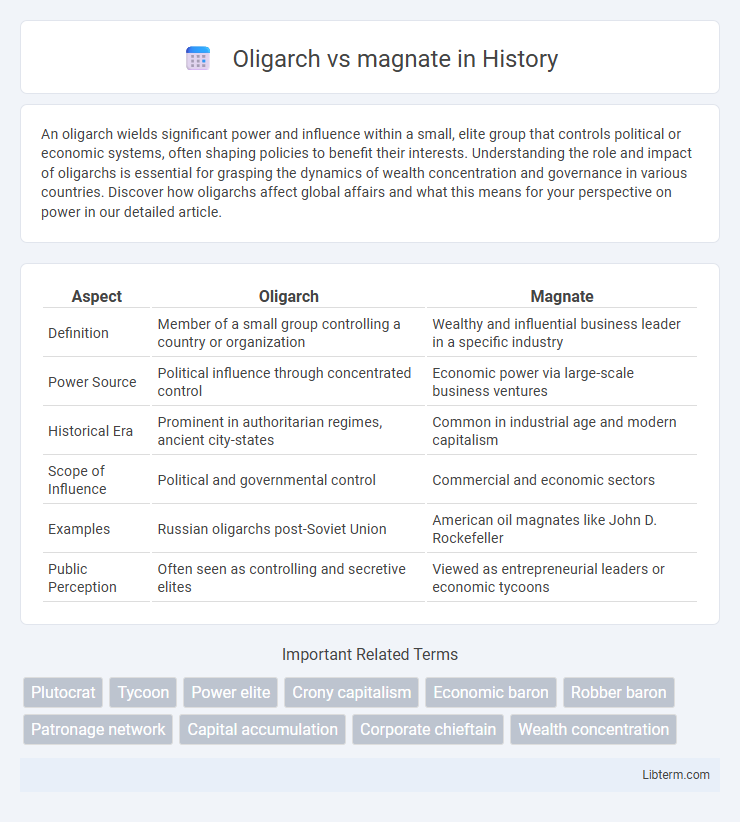An oligarch wields significant power and influence within a small, elite group that controls political or economic systems, often shaping policies to benefit their interests. Understanding the role and impact of oligarchs is essential for grasping the dynamics of wealth concentration and governance in various countries. Discover how oligarchs affect global affairs and what this means for your perspective on power in our detailed article.
Table of Comparison
| Aspect | Oligarch | Magnate |
|---|---|---|
| Definition | Member of a small group controlling a country or organization | Wealthy and influential business leader in a specific industry |
| Power Source | Political influence through concentrated control | Economic power via large-scale business ventures |
| Historical Era | Prominent in authoritarian regimes, ancient city-states | Common in industrial age and modern capitalism |
| Scope of Influence | Political and governmental control | Commercial and economic sectors |
| Examples | Russian oligarchs post-Soviet Union | American oil magnates like John D. Rockefeller |
| Public Perception | Often seen as controlling and secretive elites | Viewed as entrepreneurial leaders or economic tycoons |
Defining Oligarch and Magnate: Key Differences
An oligarch is typically part of a small group of powerful individuals who wield significant political influence over a country, often controlling government or public institutions behind the scenes. In contrast, a magnate is a wealthy and influential businessperson dominating a particular industry or market without necessarily holding political power. The key difference lies in oligarchs' direct involvement in political control contrasted with magnates' focus on economic dominance within private enterprise.
Historical Origins of Oligarchs and Magnates
Oligarchs historically emerged from powerful ruling elites who controlled political power and wealth in ancient city-states and empires, such as those in Ancient Greece and Rome. Magnates, on the other hand, trace their origins to the medieval European nobility and landowning aristocracy, who held vast estates and influenced monarchies through wealth and titles. Both groups played crucial roles in shaping political and economic systems, with oligarchs dominating governance structures while magnates controlled extensive land and resources.
Power Structures: How Influence is Gained
Oligarchs gain influence through control of political power and close ties to government institutions, often consolidating wealth by leveraging state resources and political networks. Magnates accumulate power primarily via business empires and market dominance, using economic success and entrepreneurial skills to shape industries and influence policy indirectly. Both roles wield significant influence, but oligarchs operate within political power structures, whereas magnates rely on economic clout and private sector leadership.
Economic Impact of Oligarchs vs Magnates
Oligarchs often wield concentrated economic power by controlling large sectors of national economies, influencing government policies to benefit their interests and potentially limiting market competition. Magnates, typically entrepreneurs or leaders of vast business empires, drive economic growth through innovation, job creation, and investments in diverse industries. The economic impact of oligarchs can lead to wealth concentration and political influence, while magnates contribute more directly to market dynamism and economic diversification.
Political Connections and Their Roles
Oligarchs wield significant political power through direct connections with government officials, often influencing policy to protect their business interests and maintain economic dominance within a country. Magnates primarily focus on amassing wealth in specific industries but may leverage political relationships to expand their ventures or gain competitive advantages without necessarily controlling political agendas. The overlap between oligarchs and magnates lies in their ability to use economic influence to shape political decisions, though oligarchs typically hold more explicit and extensive roles in governance.
Media Representation and Public Perception
Oligarchs often appear in media as powerful elites controlling political and economic systems, while magnates are portrayed as influential business leaders shaping industries. Public perception of oligarchs tends to be ambivalent or negative due to associations with corruption and concentrated power, whereas magnates are frequently admired for entrepreneurship and innovation. Media representation impacts these views by emphasizing oligarchs' political ties and magnates' market success, influencing societal attitudes toward wealth and authority.
Global Examples: Notable Oligarchs and Magnates
Roman Abramovich, a Russian oligarch, wields significant influence over political and economic spheres through ownership of major assets such as steel and mining companies. In contrast, American magnates like Jeff Bezos and Elon Musk have reshaped global markets by pioneering innovations in technology and e-commerce, amassing wealth primarily through entrepreneurship. South Africa's Patrice Motsepe exemplifies a magnate with substantial holdings in mining and finance, highlighting regional variations in the profiles of influential business leaders.
Legal and Ethical Considerations
Oligarchs often wield significant political power and influence, raising legal concerns about corruption, nepotism, and monopolistic practices that undermine democratic institutions. Magnates typically gain their wealth through large-scale business ventures, facing ethical scrutiny related to labor practices, environmental impact, and corporate governance. Both roles demand rigorous adherence to legal frameworks to ensure transparency and accountability in their financial and political activities.
Oligarchs and Magnates in Modern Society
Oligarchs in modern society wield concentrated political and economic power, often influencing government policies and controlling key industries within a few wealthy families or individuals. Magnates, however, primarily dominate specific sectors through vast business empires, such as technology, media, or finance, shaping markets and consumer trends without direct political control. Understanding the distinctions highlights how oligarchs impact governance and societal structures, while magnates drive innovation and economic growth through entrepreneurial dominance.
Future Trends: The Evolving Landscape of Wealth and Power
The future landscape of wealth and power will witness a shift where oligarchs increasingly leverage technology and global networks to maintain influence, whereas magnates focus on innovation-driven industries to reshape markets. As digital economies expand, oligarchic control may evolve through strategic investments in emerging sectors like artificial intelligence, cryptocurrency, and renewable energy. Magnates will likely drive transformation by fostering entrepreneurial ecosystems and disruptive start-ups, signaling a dynamic interplay between inherited power and merit-based wealth creation.
Oligarch Infographic

 libterm.com
libterm.com